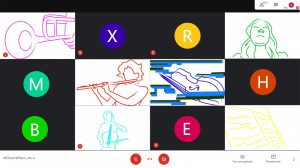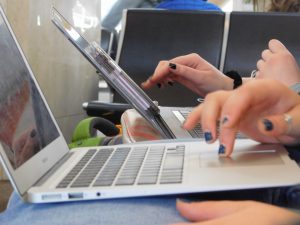LEAP courses shift in COVID-19
The Hamline Plan LEAP requirement is being modified during the coronavirus pandemic.
April 27, 2020
As COVID-19 has resulted in online learning for the rest of the 2019-2020 school year, courses offering the Liberal Education as Practice (LEAP) credit have needed to adapt in order for students to fulfill the Hamline Plan requirement.
“Alternate assignments and internships in general are all being managed on a case by case basis and no student is being asked to drop their internship as a result of the extraordinary situation,” said Ayn Rassier, the Internship Program Coordinator for the Career Development Center. “The response is the same regardless of the class year of the student who is registered.”
Temporary closures of non-essential businesses due to stay-at-home orders have resulted in some current internships being cut short. Other internship opportunities may be withdrawn as businesses reassess staffing needs and resources.
“If students had an internship lined up for the summer that is now cancelled or on hold, or if they are currently participating in one this term that has been impacted, they should reach out to me directly to determine next steps, especially those students who are currently registered,” Rassier said.
According to Rassier, students currently registered for internships impacted by COVID-19 are working with faculty supervisors to “determine alternate assignments to help to bridge the gap between missed hours and the overall requirement,” Rassier said.
Rassier recommends students continue to search for and apply to internships for the summer and fall if they still hope to complete one.
In addition to internships, this spring there are 21 courses offering the LEAP credit, seven of which are major-specific senior capstone/practicum/research courses.
Hamline’s Undergraduate Curriculum Committee (UCC) sent faculty an email in March which included ideas for adapting LEAP-credited courses. These included exploring videos with critical reflections, virtual volunteering and TAs helping to construct/implement remote learning.
Valentine Cadieux, a professor in Environmental Studies and Anthropology, and Director of Sustainability, is teaching “WasteLess: Pollution Prevention Education” this semester, a 2-credit LEAP course associated with the Campus Sustainability course.
“Students are still working on the same campus sustainability education projects they were working on before break—they’ve just had to focus more on the curricular and virtual side of these education projects,” Cadieux said.
This course offers students the chance to use peer education as a way to put what they learn in Campus Sustainability into action. Before going virtual, they would table in Anderson.
“I’m disappointed that we can’t continue to table or take our education outside of the classroom anymore,” said Amanda Libby, a student in the class. “But my professor has been giving us a lot of time to work on our individual projects and encourages us to find ways at home to continue diverting waste.”
Some examples of their projects now include developing digital programming to be shared online and will play on interactive digital kiosks that have been developed by the Center for Global Environmental Education (CGEE). Another team is working with dining services to discuss how the packaging of foods can better align with our diversion opportunities of recycling and organics composting at Subway, Starbucks, and Athletic concessions. One is working with the Peer Wellness Educators to develop socially distanced ways to engage Stress Fest.
Other forms of LEAP are overseen by the Undergraduate Curriculum Committee and the departments and faculty carrying out the course.
Faculty such as Kim Koeppen, professor in the School of Education (HSE) and director of Undergraduate Curriculum, have found it important and challenging to still build a community during remote learning. Koeppen said community allows for students to feel comfortable when discussing discomforting issues.
“While I fully expect that I will engage in face-to-face instruction at some point in the future, I am realizing that an online space can be beneficial to some students,” Koeppen said. “So if I want to incorporate more online opportunities for students in future semesters, I need to fill in my knowledge gaps about best practices in an online environment.”



